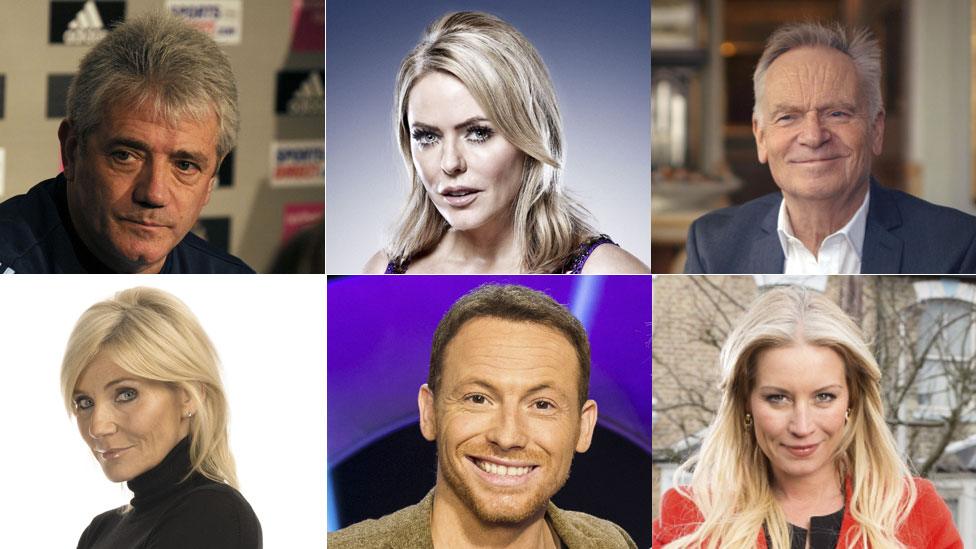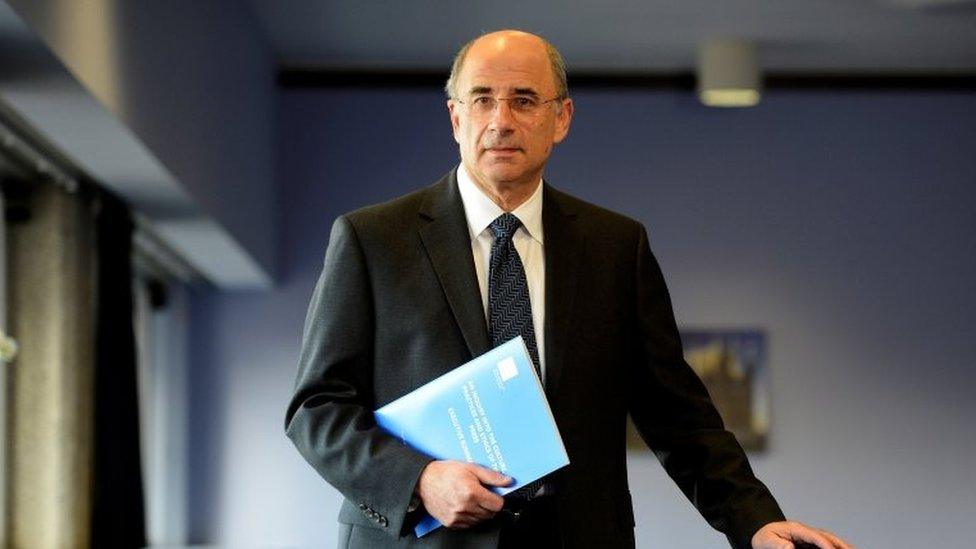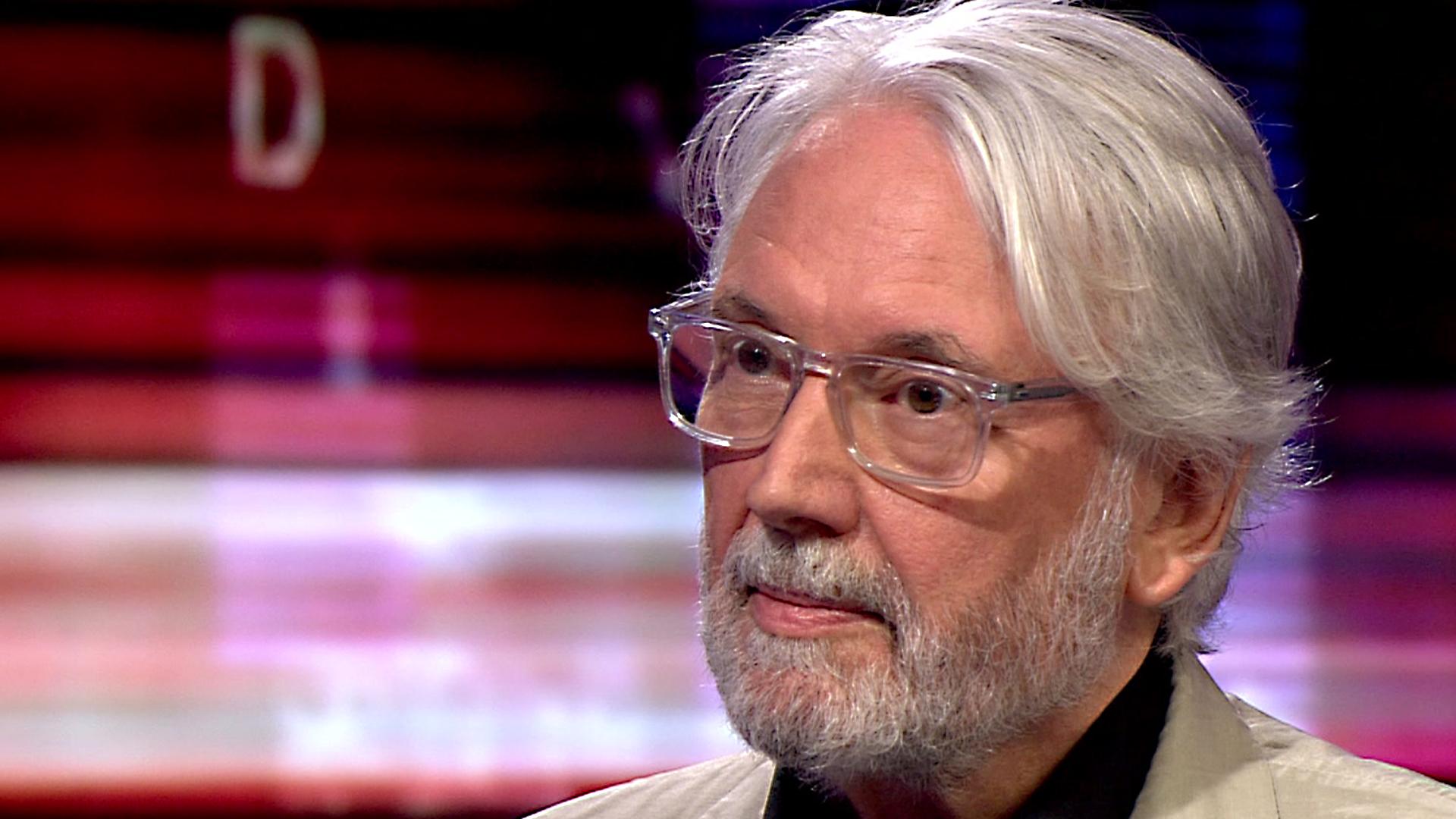Papers' phone-hacking bill 'could reach £1bn'
- Published

(L-R) Kevin Keegan, Patsy Kensit, Lord Archer, Michelle Collins, Joe Swash, and Denise Van Outen settled claims with the Mirror group in 2017
The publishers of the Sun and now-defunct News of the World, along with the publishers of the Mirror Group newspapers, could face a total bill for phone hacking of up to £1bn, says the group representing the victims.
Settlements to victims, plus legal costs, already total nearly £500m.
There are hundreds more claims already under way and many thousands more victims who could potentially claim.
"More and more victims contact us each year," said Hacked Off's Nathan Sparks.
He told the BBC that this suggested there could be many hundreds or thousands more still to come.
"The apparent willingness of the Mirror Group Newspapers and Sun owners News UK to settle cases at seemingly any price indicates a desperation to avoid having these claims heard in open court - which would expose multiple allegations of corporate wrongdoing and criminality to the public gaze," he added.
"With the expenditure of all publishers taken into account, the total cost of the scandal could exceed £1bn - with virtually no accountability for the executives who have presided over it."
A spokesperson for News UK simply said: "We can't comment on active litigation." The Mirror Group also declined to comment.
The revelation that News of the World employee Glenn Mulcaire hacked the phone of murdered teenager Milly Dowler caused national outrage and led to a public inquiry into the behaviour of the press, the police and politicians, chaired by Lord Justice Sir Brian Leveson.
That inquiry was split into two parts, with part two deferred until after criminal prosecutions had been concluded - which they were in 2016.
The government then closed down the second part of the inquiry, meaning many of the claims of the victims were never heard in an open forum.
Phone-hacking campaigners had hoped that a series of civil trials involving hundreds of victims would see fresh claims of wrongdoing by journalists, editors and owners at the Sun, the Mirror and the Sunday Mirror tested in reportable court proceedings.
News UK has always insisted that the illegality was confined to the News of the World.

Lord Justice Sir Brian Leveson's inquiry led to criminal convictions
It is true that the original Leveson inquiry led to criminal convictions mainly of people employed by the News of the World, with one journalist, Dan Evans, pleading guilty to hacking at both that paper and at the Sunday Mirror.
The convictions included that of Glenn Mulcaire, the man who hacked Milly Dowler's phone. He never testified in Leveson 1 because of his involvement in a criminal trial that resulted in him being sentenced to nine months in prison.
However, the judge in a civil trial against the Mirror that subsequently DID make it all the way to court ruled that phone-hacking at the Mirror was "widespread, institutionalised and long-standing".
A spokesperson for the publishers of the Mirror said: "We don't believe there would be any merit in spending public money to hold a Leveson 2 inquiry today. The practices of the past which gave rise to the original Leveson inquiry have long since been banished from our newsrooms."
So far, News Group has paid out £400m and the Mirror's owners £75m.
These settlements are entered into voluntarily by the claimants, but even if they are satisfied with the money they received, many activists remain unsatisfied that the full extent of phone-hacking and other press intrusion was never explored in public.
The government has defended its decision to shut down Leveson 2, saying that because of significant changes in the media landscape since Leveson 1, proceeding further "was no longer appropriate, proportionate, or in the public interest".
Sir Brian Leveson himself strongly rejected that conclusion in a letter to the government.
Actor and phone-hacking victim Hugh Grant told the BBC the conclusion was deeply unsatisfactory.
He said: "The vast majority of people who were running the press pre-Leveson are still in place to this day and they got away scot-free, precisely because the Leveson inquiry was always supposed to be split into 2 parts, because the second part - who did what to who - the precise gradual stuff had to be delayed until after the civil criminal trials.
"And once they did finish, Theresa May completely backed down."
The press, the police and the politicians tell the public Leveson 1 forced everyone to clean up their act. But many activists and victims feel that an awful lot of dirty linen remains unwashed.
The newspaper owners involved have paid hundreds of millions of pounds to keep it that way.
The Press, the Police, the Politicians and their Public airs on Radio 4 on Sunday 5 May at 13:30.
- Published24 May 2018

- Published1 March 2018
